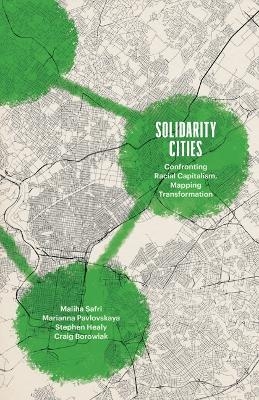
Solidarity Cities
University of Minnesota Press (Verlag)
978-1-5179-1602-2 (ISBN)
- Noch nicht erschienen (ca. Januar 2025)
- Portofrei ab CHF 40
- Auch auf Rechnung
- Artikel merken
Solidarity economies, characterized by diverse practices of cooperation and mutual support, have long played pivotal but largely invisible roles in fostering shared survival and envisioning alternatives to racial capitalism globally and in the United States. This book maps the thriving existence of these cooperative networks in three differently sized American cities, highlighting their commitment to cooperation, democracy, and inclusion and demonstrating the desire—and the pressing need—to establish alternative foundations for social and economic justice.
Collectively authored by four social scientists, Solidarity Cities analyzes the deeply entrenched racial and economic divides from which cooperative networks emerge as they work to provide unmet basic needs, including food security, affordable housing, access to fair credit, and employment opportunities. Examining entities such as community gardens, credit unions, cooperatives, and other forms of economic solidarity, the authors highlight how relatively small yet vital interventions into public life can expand into broader movements that help bolster the overall well-being of their surrounding communities.
Bringing together insights from geography, political economy, and political science with mapping and spatial analysis methodologies, surveys, and in-depth interviews, Solidarity Cities illuminates the extensive footprints of solidarity economies and the roles they play in communities. The authors show how these initiatives act as bulwarks against gentrification, exploitation, and economic exclusion, helping readers see them as part of the past, present, and future of more livable and just cities.
Retail e-book files for this title are screen-reader friendly with images accompanied by short alt text and/or extended descriptions.
Maliha Safri is professor of economics at Drew University and has written for publications such as Antipode, Signs, and Environmental Policy and Governance. Marianna Pavlovskaya is professor of geography at Hunter College and coeditor of Rethinking Neoliberalism: Resisting the Disciplinary Regime. Stephen Healy is associate professor of geography at Western Sydney University and coauthor of Take Back the Economy: An Ethical Guide for Transforming Our Communities. Craig Borowiak is professor of political science at Haverford College and author of Accountability and Democracy: The Pitfalls and Promise of Popular Control.
Contents
Preface
Introduction: Solidarity Economies and the Unmaking of Racial Capitalism
1. Seeing Solidarity Cities: The Power of Mapping and Counter-Mapping
2. Making Cities with Solidarity through Time
3. Constructing the Solidarity City, Stone by Stone
4. Navigating Fault Lines in the Food Solidarity Economy
5. Edgework: Cooperative Encounters
6. Bulwarks: Build and Defend the Solidarity City
Conclusion: Horizons of Economic Solidarity and More Livable Worlds
Acknowledgments
Appendix: Glossary and Resources
Notes
Bibliography
Index
| Erscheint lt. Verlag | 7.1.2025 |
|---|---|
| Reihe/Serie | Diverse Economies and Livable Worlds |
| Zusatzinfo | 2 black and white illustrations, 29 color images, and 5 tables |
| Verlagsort | Minnesota |
| Sprache | englisch |
| Maße | 140 x 216 mm |
| Gewicht | 340 g |
| Themenwelt | Naturwissenschaften ► Geowissenschaften ► Geografie / Kartografie |
| Sozialwissenschaften ► Soziologie | |
| ISBN-10 | 1-5179-1602-X / 151791602X |
| ISBN-13 | 978-1-5179-1602-2 / 9781517916022 |
| Zustand | Neuware |
| Haben Sie eine Frage zum Produkt? |
aus dem Bereich


